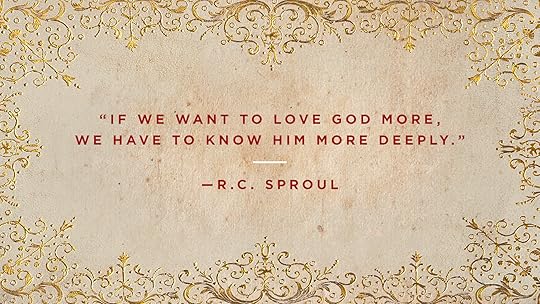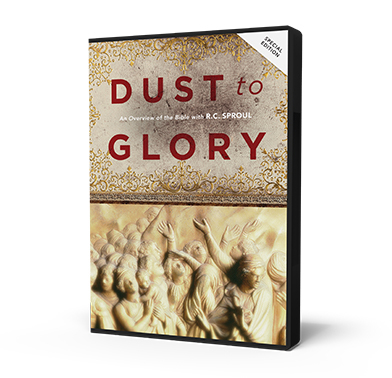R.C. Sproul's Blog, page 118
October 15, 2019
Assurance of Faith, A New Teaching Series from Joel Beeke

Are you sure you’re saved? Many Christians wrestle with this question, agonizing over guilt and worrying whether they’re truly in Christ. But it doesn’t have to be this way.
In his new eleven-part video teaching series, Dr. Joel Beeke examines the Bible and the Westminster Confession of Faith to help believers lean on God’s promises and find assurance. This is a series to comfort struggling Christians, encourage the assured, and caution those who take their assurance for granted.
This teaching series is available now for purchase on DVD or CD, as a digital download, or as a Ligonier Connect course. A corresponding study guide is also available.
Eleven 23-Minute Messages:
Assurance Defined
Lack of Assurance
Biblical & Normative Views
Church History
Divine Promises
Personal Evidences
The Testimony of the Holy Spirit
Cultivating Assurance
Renewing Assurance
The Role of the Holy Spirit
Practical Applications
Purchase Options:
Purchase on DVD ($43.20)
Purchase on CD ($27.90)
Download audio and video ($19.80)
Purchase the accompanying study guide ($12.00)
Enroll on Ligonier Connect ($9.00/month)
Dr. Joel R. Beeke is president of Puritan Reformed Theological Seminary and pastor of Heritage Netherlands Reformed Congregation in Grand Rapids, Mich. He is author of Piety: The Heartbeat of Reformed Theology.


Mentor Us
Here’s an excerpt from Mentor Us, Nicholas T. Batzig's contribution to the October issue of Tabletalk:
It would be impossible to measure the impact that William Still had on a generation of ministers throughout the latter part of the twentieth century. Although Still is now in glory with Christ, his ministry continues to influence ministers on both sides of the Atlantic in the twenty-first century. I have no doubt that it will continue to do so for decades—even for centuries—to come. His fifty-two-year ministry in Gilcomston South Church in Glasgow, Scotland, had a worldwide impact on expository preaching and pastoral ministry. This was due—at least in part—to the fact that Still poured himself into the lives of many young men preparing for ministry. Some of the most gifted and beloved ministers throughout the world spent time learning from Still at Gilcomston South. From all accounts, William Still was the quintessential ministerial mentor.
As a young seminarian, I frequently heard Sinclair Ferguson speak about the impact that Still had on his own life and preparation for ministry. As he expressed affectionate gratitude for the ways in which his mentor poured into him, welling up in my own heart was a longing to have that same blessed experience. However, there seemed to be two obstacles. The first was a fear of rejection. I was too reticent to ask men I admired if they would mentor me because I knew they might decline. The second was the perception of uninterest. The ministers I most admired seemed to be too engaged in their own ministries to mentor young men preparing for ministry. However right or wrong that fear was—and however true or untrue my perception was—of this much I am sure: I wasn’t asking and they weren’t pursuing. In many discussions I have had with other ministers over the years, this is a commonly shared experience.
Continue reading Mentor Us, or begin receiving Tabletalk magazine by signing up for a free 3-month trial.
For a limited time, the new TabletalkMagazine.com allows everyone to browse and read the growing library of back issues, including this month’s issue.


Luther and the Thunderstorm
Why did Martin Luther call out to Saint Anne during a terrifying thunderstorm? In this brief clip, Stephen Nichols takes us back to the incident that led Luther to become a monk.
This Reformation Month, watch a short video every day on the history and insights of the Protestant Reformation. And don't forget that for this month only, you can request your free digital download of R.C. Sproul’s video teaching series Luther and the Reformation plus the ebook edition of The Legacy of Luther, edited by R.C. Sproul and Stephen Nichols at ligm.in/Reformation. Offer ends October 31, 2019.
Transcript
In 1505, Martin Luther was here in Erfurt. He had received his master's degree in January, and he just spent a few months studying law. He thought he'd go home and pay a visit to his family, so he traveled about 90 kilometers to the north to the town of Mansfeld. On the way back, Luther was caught in a violent thunderstorm, in fact, he thought God had unleashed the very heavens to take his life. So Luther tried to get shelter, and he found this big granite rock, and he grasped it, and he cried out, "Help me, Saint Anne, and I will become a monk."
As Luther's biographer Roland Bainton puts it, 'God kept his vows, and Luther kept his.' Luther survived the thunderstorm. He made his way back here to Erfurt, and he threw a party for his friends. He gave away his law books, he gave away his law cap, and he entered the monastery here in Erfurt. Luther thought that somehow by becoming a monk, he would solve his spiritual struggles. The word we use to describe these struggles is the word anfechtungen—struggles in the plural, a deep-seated soul anxiety. You see it in Luther at the thunderstorm, and you see Luther crying out "Help me St. Anne. Why does he cry out to Saint Anne? Well for one, this is the only mediator that Luther knows.
Saint Anne was the patron saint of miners, not minors but miners as in the profession. And that was a profession of Luther's father, Hans Luther. He owned a copper mine, in fact, he had worked hard enough to own one mine, and he managed a second mine. He was very entrepreneurial and took on a second job as it were so that he could provide an education for his son. And as a miner, the patron saint was Saint Anne. There would have been a shrine in Luther's childhood home to Saint Anne. When he had visited there in Mansfeld, he would have seen Saint Anne's shrine. He probably prayed to Saint Anne before he set out on his journey. And when he found himself in that intense moment he cried out to Saint Anne for help. That was the only mediator that Luther knew.


October 14, 2019
If People Do Not Know the Bible, They Cannot Know God

You’ve noticed it, haven’t you? It’s hard to miss.
Whether in movies, TV programs, or music, we rarely see people and stories from the Bible referenced as often as we once did. Even among unbelievers, it used to be respectable, even desirable, to quote positively from the Bible. Just think about how many times Shakespeare quoted from the Geneva Bible.
But no more. It’s out of fashion. Christians understand this because we know that in their fallen condition, people do not want God in their thinking.
Yet, what is thoroughly perplexing is the prevailing biblical illiteracy we find among those who profess the name of Jesus.
Oddly enough, I even hear this from seminary professors who tell me that each year, their students—the pastors and teachers of tomorrow—know less Scripture than the students who began their studies the previous year. There’s a stunning lack of biblical preaching in the evangelical church. Funny stories, self-help programs, entertaining stunts, and slick talks from self-appointed gurus have taken the place of the teaching of God’s Word in too many churches. Our bi-annual State of Theology survey consistently reveals this disastrous trend.
The impact of this problem can’t be overestimated. As Dr. Sproul and other pastors and theologians have recognized throughout history, if people don’t know their Bibles, they can’t know God. And if they do not know God, they will not have eternal life.
I love serving with you in this great ministry of Ligonier because we strive by God’s grace to turn the tide on biblical illiteracy. We are Bible-centered. May we always remain so. There is nothing more important to us than seeing as many people as possible grow in their understanding of Scripture. The Word of God is what the Holy Spirit uses to awaken us to new spiritual life and sustain us in Christ. Changed lives for the glory of God is the goal. Just as R.C. faithfully ran the race of his ministry, teaching and preaching in season and out, let us redouble our efforts to boldly proclaim, “Thus says the Lord.”
Ligonier brings trustworthy Bible teaching to millions in an easily understood way, using every available media possible. Yours is an essential part of our global outreach.
R.C. captured this Bible emphasis well: “If we want to love God more, we have to know Him more deeply. And the more we search the Scriptures, and the more we focus our minds’ attention on who God is and what He does, the more we understand just a tiny little bit more about Him and the more our souls break out in flame.”
That vision is our heartbeat. Let’s expand our outreach to come alongside Christians at every age and stage of their lives to deepen their knowledge of the Bible, helping them to love God more as they know Him through His revealed Word.
Ligonier is actively expanding our library of Bible-teaching resources and seeking new ways to get them into the hands of people everywhere. We’ve recently added teaching series on the Great Commission, the Lord’s Prayer, the Upper Room discourse, Deuteronomy, Job, the Psalms, and the book of Judges. We are currently developing new series on the book of Galatians and on the benedictions and doxologies of Scripture. With your continued support, we want to introduce a youth edition of the Reformation Study Bible and many other exciting projects. We’re also continuing and expanding the daily Bible teaching found in Tabletalk magazine, Renewing Your Mind, our various podcasts, and more.
We’re doing this work not only in English, but we also aim to get this vital discipleship material into other languages as well—thirty-six and counting. For instance, we have recently launched dedicated outreach in Arabic, lifting up the person and work of Jesus Christ among Muslims throughout the Middle East and North Africa. R.C.’s classic Bible overview series Dust to Glory will be available online and through other channels to the Arabic-speaking world. Farsi will also be launching this year, penetrating through satellite TV into Iran and Afghanistan.
Speaking of Dust to Glory, this classic series is the single most-demanded Ligonier video teaching resource internationally. As you know, it is incredibly difficult in many countries to access trustworthy biblical teaching, and we’re committed to helping reverse this. Now is not the time to slow or pause our outreach.
Dust to Glory takes a panoramic view of Scripture, examining its major themes and figures in order to assist people in seeing the unity of God’s plan and purpose from Genesis to Revelation. It’s a core Ligonier resource, and Dr. Sproul regarded it as one of the most important projects he ever took part in.
If you do not have a copy or would like an extra one to share with a friend, we’ll expedite these 57 messages to you when you give a gift of any amount to strengthen Ligonier’s Bible-teaching outreach this month. You’ll receive the special edition Dust to Glory series on DVD with accompanying study guide. And your gift will help sustain and grow Ligonier’s worldwide ministry of equipping believers with sound, Scripture-centered teaching.
Thank you for your support of Ligonier.
Get This Resource
Offer ends December 31, 2019. U.S only.


A False Church
Martin Luther initially hoped that the Roman Catholic Church would reform from within, but when it would not, he concluded that it was a false church. In this brief clip, W. Robert Godfrey examines some of Luther’s harsh words for Rome.
This Reformation Month, watch a short video every day on the history and insights of the Protestant Reformation. And don't forget that for this month only, you can request your free digital download of R.C. Sproul’s video teaching series Luther and the Reformation plus the ebook edition of The Legacy of Luther, edited by R.C. Sproul and Stephen Nichols at ligm.in/Reformation. Offer ends October 31, 2019.
Transcript
One of the harder things for moderns to understand is that in the sixteenth century there was absolutely no notion of denominationalism. For centuries, almost from its beginning, the church had thought about the church as either the true church or false churches. You know, today—I'm a Presbyterian, you're a Baptist, somebody else is Lutheran—we have differences, and we may even see some of our differences as important, but we regard one another as Christians. That was not the case through most of the history of the church. You were in either in the one true church or you were part of a false church.
[Martin] Luther initially hoped very much to be a positive reforming influence in what he saw as the one true church, but when it became more and more obvious that the Roman Catholic Church would not listen to him, would not reform itself, Luther's conclusion was that Rome is establishing itself as a false church. That's why fairly early on in the 1520s Luther begins to talk about the pope as the antichrist. Again, maybe when people in the twenty-first century read that, they think he's being sort of rhetorical. He was not being rhetorical. He believed that the pope was the eschatological revelation of the antichrist at the end of the age. So Luther is very earnest in everything that he says both about the pope and about the Church of Rome. What's interesting is that when you read most Protestant writers in the sixteenth century, they never refer to the “Catholic church.” They refer to the Roman church, and their argument is that we are the catholic church. We are the universal church. We stand in unity with the church of all ages.
Now Luther and all the Reformers believed there were true Christians in the Roman church that still held to the gospel, but they believed they could say that the Roman church was a false church because it's official teachers had rejected the gospel.


What Is the Role of Civil Authorities in the Christian Life?

We honor Christ by submitting to the authorities placed over us, unless they command what God forbids or forbid what He commands. From one of our Ask R.C. events, R.C. Sproul considers the role of civil authorities in the Christian life.
To get real-time answers to your biblical and theological questions, just Ask.Ligonier.org.
Read the Transcript


The Instrumental Cause of Justification

The Reformation doctrine of justification is frequently summed up in the slogan sola fide, which means “by faith alone.” The phrase sola fide stands for the teaching that justification is by faith alone.
The Roman Catholic Church, historically, has also taught that justification is by faith. They say that faith is the initial stage of justification. It is the foundation and root of our justification. Rome insists on the necessity of faith for justification. So the fide in sola fide is clearly affirmed by Rome. What is not affirmed by Rome is the sola, because even though faith is the initiation, the foundation, and the root of justification, its mere presence is not enough to effect justification. There must be something besides faith in order for us to be justified—a necessary condition. A necessary condition is something that must be present in order for an effect or consequence to follow, but its presence does not guarantee the result.
For example, under normal circumstances, a necessary condition for fire is the presence of oxygen. But, fortunately for us, the mere presence of oxygen is not enough to cause a fire. If it were, we would catch on fire every time we took a breath of air. So we distinguish between a necessary condition and a sufficient condition. A sufficient condition absolutely guarantees that the result will follow.
Given that distinction, we can see the difference between the Roman Catholic view and the Reformation view of the relationship between faith and justification. In the Roman view, faith is a necessary condition for justification, not a sufficient condition for it. In the Protestant view, faith is not only a necessary condition but also a sufficient condition for justification. That is, when we put our faith and trust in Christ, God will most surely declare us justified in His sight. The Reformation view, which is the biblical view, is that if faith is present, justification is inevitably present as well.
What is unthinkable in the Reformation view is that we could have faith without justification. We cannot have justification without faith, and we cannot have faith without justification. Rome says that we cannot have justification without faith, but we can have faith without justification. We can keep our faith but commit a mortal sin that will destroy the grace of justification, so that we will be damned (without proper penance). But for the Reformers, the mere possession of genuine faith is all that is required in order for us to receive the grace and maintain the state of justification.
The confession says this:
Faith, thus receiving and resting on Christ and his righteousness, is the alone instrument of justification.
An instrument is a tool that is used for a particular purpose. When the framers of the Westminster Confession wrote that faith is the alone instrument of justification, they were aware of the sixteenth-century dispute regarding the instrumental cause of justification. It is necessary to have a clear understanding of this doctrine—the instrumental cause of justification—because it is about how we are saved.
The term instrumental cause goes back in history to the fourth century before Christ, to the philosophy of Aristotle. He was concerned to explain motion and change. In that process, he tried to isolate various causes that contribute to something’s change of state or status. How does that relate to our question here? We, by nature, are not justified. We are unjust, and our status before God is that we deserve his unmitigated wrath. We need a change of our status, from a state of damnation to a state of justification.
Aristotle distinguished four kinds of causes: the formal cause, the efficient cause, the final cause, and the material cause. He did not include the instrumental cause. His four causes, however, formed the basis for the idea of instrumental cause.
He used the illustration of a statue that starts out as a block of stone from the quarry. Aristotle defined the block of stone as the material cause, the stuff out of which something is made. The formal cause is the idea in the sculptor’s mind, or his blueprint or sketch, of the way that he wants the finished product to look. There has to be an idea before there can be a result. The efficient cause is that which brings about the change from stone to statue, and in this case it is the sculptor. He is the one who makes it happen. The final cause is the purpose for which the thing is made, which in this case may be to beautify a garden.
To these four causes, we may add the idea of the instrumental cause, which is the means by which the change takes place. If the sculptor wants to change the block of stone into a statue, he has to chip away at the stone to shape, form, and smooth it. His chisel and his hammer are the instruments, the means by which the change is wrought. In English, we often indicate means with the words by and through.
When the Reformers said that justification is by faith or through faith, they affirmed that the means or the instrument by which we are justified is faith and faith alone. The only instrument that we need, the only tool required to move us from a state of damnation to a state of justification is faith, but faith is not the only thing that we need in order to be justified. We also need Christ in order to be justified. That is, in order to be justified, we need His perfect righteousness and His atonement on the cross. Everything that is required by God to meet His standard of righteousness and justice has been fulfilled objectively in and through the work of Christ. He has done it all. The whole Roman Catholic–Protestant debate on justification is not over the objective work of Christ so much as it is over how we receive the benefits of His work. How is the objective work of Christ subjectively appropriated? The answer that the Reformers gave, based on the teaching of the Apostle Paul, was “in and through, or by and through, faith alone.” But it is not faith alone that saves us. When we say that justification is by faith alone, we are saying that justification is by and through our faith in Christ alone.
The instrumental cause of justification, according to Rome, is baptism and penance. Rome defines these sacraments as the instruments by and through which a person is justified. The difference is between salvation that is accomplished sacerdotally (that is, through the church’s administration of the sacraments) and salvation that is experienced through faith in Christ alone. This is all the difference in the world. The confession says that faith is the only instrument of justification because it is through faith alone that we rest on and receive the righteousness of Christ. The righteousness of Christ, the benefits of His atonement, the objective merit or grounds of our justification, are freely offered to anyone who believes.“The righteous shall live by faith” (Rom.1:17). We are justified not by faith plus works but by faith alone. All that is needed to enter the kingdom of God is faith or trust in the work of Christ alone.
Faith is not the grounds of our justification. The grounds of our justification is the righteousness of Christ, His merit. The Reformers said that the meritorious cause of our justification is the righteousness of Christ alone. The instrumental cause of our justification is faith, but when we say that we are justified by faith alone, we do not mean that faith is a meritorious work that adds anything to the ground of our justification.
What difference does that make practically? There are people who say they believe in justification by faith alone but who rely on their faith as if it were meritorious or a good work that will satisfy the demands of God’s justice. The fact that a person possesses faith adds no merit to his account. It adds infinite merit to his account by imputation, but it is the merit of Christ that is imputed to him. We can receive Christ’s merit only by faith, and there is no merit to that. The only One who can save us is Christ, and the only way we can get access to Him is through faith. We do not rest on anything else in our lives except Christ and His righteousness for our salvation.
This excerpt is adapted from Truths We Confess by R.C. Sproul. In Truths We Confess, now thoroughly revised and available in a single, accessible volume, Dr. Sproul introduces readers to this remarkable confession, explaining its insights and applying them to modern life. Order the hardcover book today.


October 13, 2019
What Was the Reformation All About?

Over 500 years ago, a German monk named Martin Luther started a protest that exploded into a worldwide movement. So what was the Protestant Reformation all about? This short video narrated by R.C. Sproul is a tool to help you give an answer. Share it with your family and friends. Also available in Chinese, French, German, Italian, Portuguese, and Spanish.
This Reformation Month, watch a short video every day on the history and insights of the Protestant Reformation. And don't forget that for this month only, you can request your free digital download of R.C. Sproul’s video teaching series Luther and the Reformation plus the ebook edition of The Legacy of Luther, edited by R.C. Sproul and Stephen Nichols at ligm.in/Reformation. Offer ends October 31, 2019.
Transcript
500 years ago, a German monk named Martin Luther started a protest that exploded into worldwide movement. At that time, Europe lived in the shadow of the Roman Catholic Church. It was more like an empire than a church. It crowned and cast down kings, and used its dominance to keep people in the darkness of superstition. That sounds pretty unfamiliar.
But in some ways, Luther’s day was very much like our own. Just like today, everyone had an opinion about the Bible even though almost no one had actually read it. Like so many of us, they were trusting the thought-leaders and taste-makers of their day to tell them what was in the Bible and whether or not to believe it. Luther was one of the very few people actually reading the Bible, and what he found was earth-shattering. Even though he was a monk, Luther hated the God of the Bible. But when he studied it, the world around him began to make sense. God made sense. The significance of Jesus became clear to him. He discovered the answer to his deepest question: how could evil be overcome? Specifically, how could his own evil—his own sin—be dealt with?
Luther discovered that he couldn’t do anything to fix this problem himself. He had to rely on the finished work of Christ alone. Luther had discovered a central truth. It changed his life. It changed the world. The Protestant Reformation was about two things. It was about who can say what’s true and it was about how to reconcile who we are with who God is. It recognized that God’s Word is the ultimate authority in this world, and that the perfect life and sacrificial death of Jesus Christ are the only answer for evil and the only basis on which sinners can stand before a holy God. The Protestant Reformation is a story of transformation—a transformation from hate to love, from slavery to freedom, and from blind faith to a glorious discovery of the truth in Jesus Christ.
Ligonier Ministries exists to cultivate this transformation in a new generation. In a day when few are reading the Bible, and when confusion reigns in the church, we want to help Christians know what they believe, why they believe it, how to live it, and how to share it. Join us.


October 12, 2019
An Alien Righteousness
We are saved by a righteousness that is not our own. In this brief clip, R.C. Sproul shares the good news of Christ's imputed righteousness.
This Reformation Month, watch a short video every day on the history and insights of the Protestant Reformation. And don't forget that for this month only, you can request your free digital download of R.C. Sproul’s video teaching series Luther and the Reformation plus the ebook edition of The Legacy of Luther, edited by R.C. Sproul and Stephen Nichols at ligm.in/Reformation. Offer ends October 31, 2019.
Transcript
Imputation means that the righteousness of Jesus is counted for me the moment I believe in Jesus Christ. That's what Luther said. That that righteousness an "iustitia" alien—an alien righteousness. A righteousness that's "extra nos." A righteousness that's apart from me, it's not mine inherently. It belongs to Christ. And what Christ does is when I put my trust in Him, He imputes or counts to me His righteousness. And on the basis of that imputed righteousness, God declares me just right now. So that if I die right now, I go heaven right now because I've all the righteousness I will ever need to get there, namely the righteousness of Jesus Christ. That's good news.


The State of the Church in the Sixteenth Century

Was the church in Martin Luther's time healthy? In this brief clip from his teaching series A Survey of Church History, W. Robert Godfrey explains why that is often a challenging question to answer. Watch this entire message for free.
Transcript
The church itself in the early 16th century is undergoing changes and challenges and we can perhaps say, although this is of little interest to most people, that the state of the church in the early 16th century remains a challenge to historians in the sense that we know lot about what was going on in the early 16th century, but there's a debate amongst historians as to whether the church was healthy or unhealthy in the early 16th century and it depends a little bit as to how you judge health or lack of health.
Is the church in America healthy today? Now, you see that’s a hard question to answer. Isn’t it? If you judge health by attendance, by contributions, by building activity, we could probably say that the church is pretty healthy in America today. Lot of people going to church certainly compared to Europe, lot of money going to Christian causes, lot of building going on and that was true in the early 16th century. Lot of people went to church, lot of money being given to churches, lot of building going on. But was the church spiritually healthy? Of course, that's a matter of whose notion of spirituality you hold to. Some historians want to say the church wasn’t really very healthy because piety was so external. People just thought by going through the motions they were getting closer to God and that wasn’t healthy. And that's certainly true to significant extent, but there were a lot of teachers in the church who were teaching people that that kind of externalism was in fact healthy.


R.C. Sproul's Blog
- R.C. Sproul's profile
- 1932 followers






